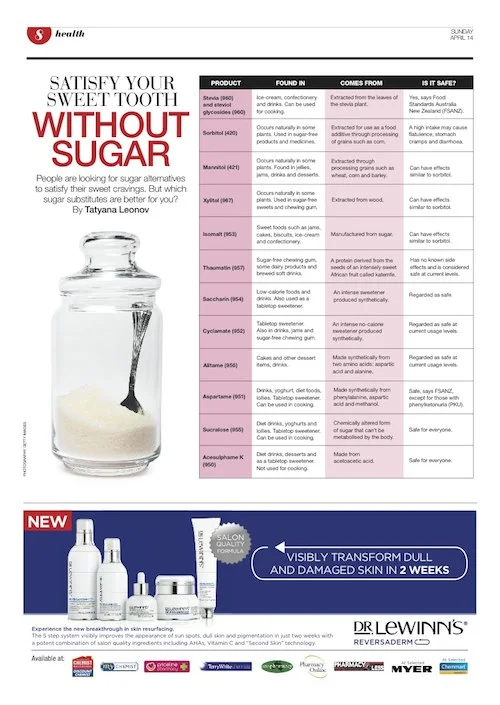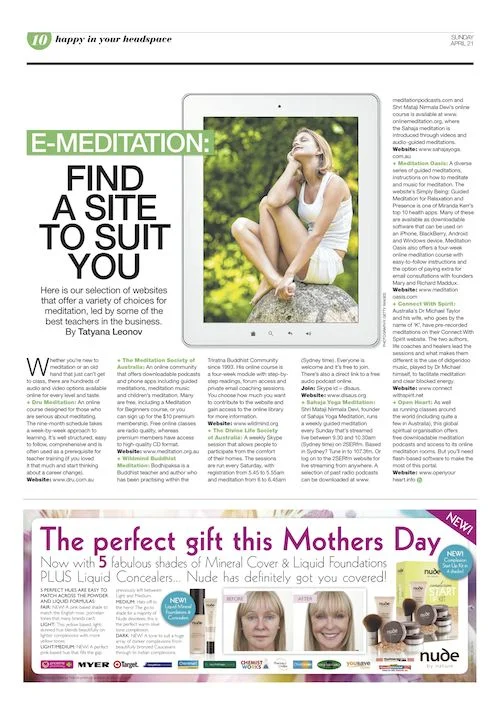Health Myths Debunked
Think you know an old wives’ tale from the truth? Tatyana Leonov separates the facts from the fiction.
YOU’LL CATCH A COLD IN THE COLD: FALSE
The common cold is a virus and whether or not you’re wearing a jacket won’t make a difference. More people do catch colds in winter but that may be because the weather keeps people indoors – where germs are more easily spread. “Many people associate the two because if the body is subjected to cold temperatures for a prolonged period, the core temperature drops, suppressing the immune system,” John Ryan, fitness supervisor at LivingWell Premier Health Club, Hilton Sydney, explains. “The best way to avoid and fight off colds is eating well and minimising stress.”
SALT IS BAD FOR YOU: SOMETIMES
Too much sodium (the main component of salt) isn’t ideal, however, the primary cause of high blood sodium levels isn’t over-consumption of salt, but dehydration. In fact, the right amount of sodium is essential for helping your body maintain good health. The National Health and Medical Research Council recommends adults keep their intake to a maximum of 2300mg of sodium per day, which is equivalent to about 6g of salt.
YOU SHOULD DRINK AT LEAST EIGHT GLASSES OF WATER A DAY: FALSE
According to the Australasian Bottled Water Institute not many people know how much water they need. “Fluid needs are highly individualised,” Alison Garth, a sports dietitian from the Australian Sports Institute, says. You require 35 to 45ml of water per kilogram of body weight per day, and that can also come from foods with a high water percentage, such as fruit. If you experience extreme heat, overindulge in salty foods or work out, your requirement will increase. How much? According to many doctors and dietitians it’s simple: enough to quench your thirst.
YOU SHOULD BRUSH TEETH STRAIGHT AFTER HAVING A SOFT DRINK: FALSE
Quite the opposite: You should wait, as brushing immediately after can be detrimental to tooth health. “After consuming anything acidic – wine (especially white and champagne), soft drinks or citrus fruits – people should wait 30 to 60 minutes before brushing,” Dr Peter Alldritt, chair of the oral health committee of the Australian Dental Association, says. “Time is needed for the saliva to re-mineralise and harden the tooth enamel.”
SITTING CLOSE TO THE TV RUINS YOUR EYES: FALSE
Even if you sit really close to the screen all night, TV can’t ruin perfectly good vision. “Sitting too close to a TV screen, just as with a computer monitor, can strain eyes, cause headaches and, at worst, worsen short-sightedness in predisposed children. However, it can’t ruin your eyes,” Dr Con Moshegov, ophthalmologist and principal surgeon at Perfect Vision Laser Correction in Sydney, says. “In the case of children, too many hours of TV is more likely to be detrimental to their developing minds than to their eyes.”
FRESH FRUIT AND VEG ARE BETTER THAN FROZEN OR CANNED: SOMETIMES
Eat week-old fruit and some of the vitamins may have been lost, similarly with cut-up veg that’s left at room temperature for a while. Freezing and canning can preserve nutrients, and according to the Australian Guide to Healthy Eating, such varieties are nutritious, often cheaper, easy to store and more readily available. “Research has shown some frozen foods have a higher nutrient value than fresh as they’re processed closer to time of picking,” dietitian Lisa Renn says. “Fresh, frozen or canned, the most important thing is you include them in your diet each day.”
SWALLOWED CHEWING GUM TAKES SEVEN YEARS TO DIGEST: FALSE
It takes about three days for your body to digest gum, and get rid of it in the stool like any other food. “While it isn’t recommended that you swallow it, the sugar will be digested and the gum residue will pass through the digestive system within a few of days,” Renn says. So it won’t stay in your body for seven days, let alone seven years.
WARM MILK BEFORE BED HELPS YOU SLEEP: FALSE
Tryptophan is an amino acid found in milk, and in large doses it can cause sleepiness – however, there’s nowhere near enough in a glass of milk. In fact, according to most doctors there’s no food that can induce sleep. Milk may not be a trigger for sleep, but childhood memories and the soothing imagery it conjures up could be.






